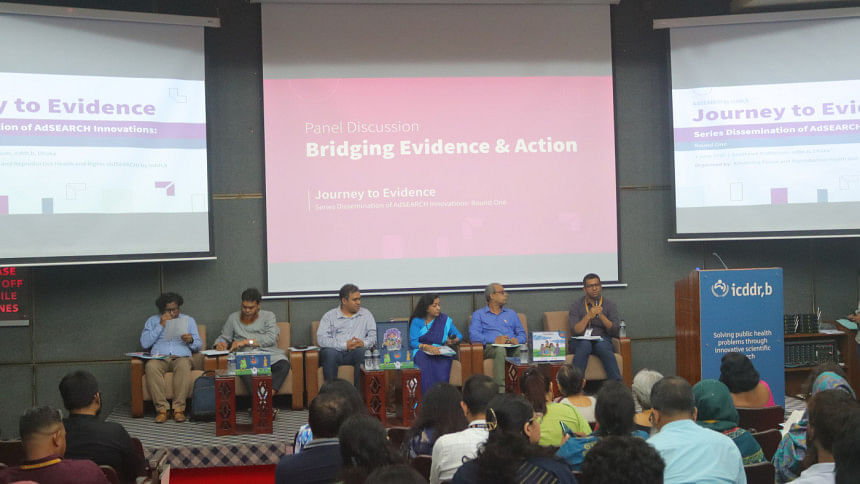86% of BKSP athletes lack proper menstrual knowledge: study

A recent study by icddr,b has revealed that 38 percent of adolescent female athletes at the Bangladesh Krira Shikkha Protishtan (BKSP) had never heard of menstruation before experiencing their first period, while 86 percent reported receiving insufficient information to manage it properly.
This significant knowledge gap -- compounded by social restrictions and limited institutional support -- poses serious physical and emotional challenges for young female athletes, ultimately hindering their performance and overall well-being, the study found.
Titled "The Status of Menstrual Health and Hygiene Knowledge among Adolescent Athletes of Bangladesh Krira Shikkha Protishtan (BKSP)," the study was conducted by the Advancing Sexual and Reproductive Health and Rights (AdSEARCH) project of icddr,b, with funding from Global Affairs Canada (GAC). It surveyed 100 female athletes aged between 12 and 19.
Despite menstruation being a natural biological process, the study found it remains a neglected issue within the country's sports policies and support systems. In structured athletic institutions like BKSP, the topic continues to be considered taboo.
Dr Mehzabin Tishan Mahfuz, principal investigator and assistant scientist at icddr,b, presented the findings yesterday at a dissemination event titled "Journey to Evidence Series: Dissemination of AdSEARCH Innovation – Round One," held at the Sasakawa Auditorium of icddr,b in the capital's Mohakhali.
The event was organised by AdSEARCH.
According to the study, none of the athletes had received formal school-based education on menstruation. While 88 percent had learned about it from family members and 61 percent from peers, only 11 percent cited textbooks as a source of knowledge, and just 5 percent received information from teachers or coaches.
Infrastructural limitations further exacerbated the issue. Only 8 percent of participants reported that toilet facilities were adequate. Cultural norms also reinforced harmful restrictions -- 57 percent said they were advised to reduce food intake during menstruation, and 65 percent reported being discouraged from engaging in physical activities.
The researchers stressed the urgent need for gender-sensitive policies and support structures in the sports sector. They advocated for breaking the silence around menstruation through open discussions, awareness campaigns, the appointment of female healthcare professionals, and comprehensive training for coaches, including male coaches.
The study urged policymakers to incorporate age-appropriate menstrual health education into sports training programmes, emphasising nutrition, cycle tracking, and safe contraceptive use.
Speaking at the event, Professor Anupam Hossain, public health expert and consultant for International Sports Development, said, "The success of Bangladeshi girls in sports is growing steadily. If we can work together to remove the barriers they face, their journey forward will be easier and more successful."
Another study presented at the event examined the feasibility and acceptability of menstrual cups among female workers in the ready-made garment (RMG) sector. Eighty-five workers from factories in Dhaka and Gazipur were introduced to the menstrual cup (a reusable device made from medical-grade silicone) which they used over six menstrual cycles.
Findings showed that the cups significantly reduced monthly hygiene costs, offered greater physical comfort, and proved compatible with the demanding work environments, especially where access to clean and private toilets is limited.
Researchers highlighted the potential of low-cost, innovative menstrual products to protect women's dignity and health in industrial settings. They called for stronger policy integration to scale up menstrual hygiene management across the labour sector.
The event also featured two other significant studies on adolescent sexual and reproductive health (SRHR), highlighting innovative approaches to reach marginalised youth in Bangladesh.
The first introduced HopeBox, an educational toolkit designed for orphaned adolescent girls. Researcher Faria Rahman revealed that girls in orphanages face high risks of sexual abuse and lack SRHR knowledge. Piloted in government-run orphanages in Dhaka, Faridpur and Chuadanga, the toolkit improved SRHR awareness from 4 percent to 59 percent.
The second initiative, Mukhurito, is a digital learning app that uses interactive stories, quizzes and modules to teach SRHR topics. Lead researcher Dr Hasan Rashek Mahmud reported that the app, piloted in three schools, led to a 16 percent rise in students' SRHR knowledge. Students also said they felt more comfortable discussing the topics with parents and teachers.
Professor Sayeba Akhter, chairperson of the Bangladesh Medical Research Council, noted, "If we fail to work on adolescent girls' health, we will not have healthy mothers. And without healthy mothers, a healthy generation cannot be built."
Farzana Sultana, development advisor at Global Affairs Canada (GAC), reaffirmed Canada's commitment to supporting sexual and reproductive health initiatives in Bangladesh.
The event concluded with closing remarks and a vote of thanks by Dr Kamrun Nahar, head of research at the Maternal and Child Health Division of icddr,b.

 For all latest news, follow The Daily Star's Google News channel.
For all latest news, follow The Daily Star's Google News channel. 



Comments